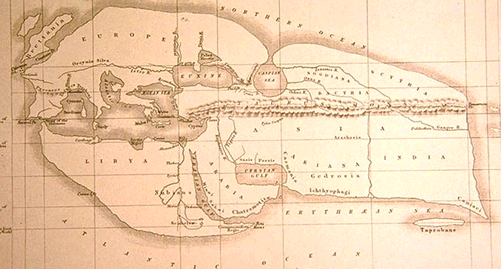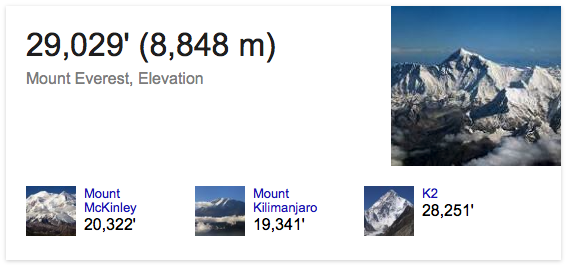With the Ken Ham and Bill Nye debate thoroughly over, but left with an unsettling taste, I had to say something.
OK I have some questions about the flood that I needed answered. An old student Trevor Cartwright brought up the Genesis account once more. Long ago I dismissed the possibility that Genesis was giving us a literal account of events in ancient history. But lingering questions remain. I am firmly convinced that God does not intend to deceive people by plain observation, and that human senses are generally reliable, especially with so many eyes on the same objects. Science does not give us absolute truth, but it does give us good probability, and human logic, though incomplete, does not deceive us as far as it goes.
So here it goes: The contention is about whether the flood is universal or local. I abandoned the prospect that it was global a long time ago because of the large number of species and the variety of species on different continents that did not seem to have known each other, and certainly not a mere 6000 years ago.
I don’t have a problem with thinking that the flood is local, and that the ancients thought the world to be very small. Here’s a rather recent map of Ptolemy’s from 105 AD, thousands of years after the supposed universal flood.

Ptolemy’s world was much tinier than ours, and I can imagine the sort of thinking that went into his worldview. I don’t suppose that he would have found universal assent for what he included or what he left out though, the proportions or topology. A universal flood for Ptolemy, a far more educated and knowledgable person than Moses or the scribes who compiled the text of scriptures in 550 BC, would have been possible, since the world was so small.
I got to thinking though, if as Genesis 7:20 says, “The waters rose and covered the mountains to a depth of more than fifteen cubits” (NIV) then a universal flood would have covered Mt. Everest by more than 23 feet. A note by the translators suggests that this passage could be translated “rose more than fifteen cubits, and the mountains were covered” does not suggest more than a local phenomena, a common occurrence for the Mesopotamian river basin. Many readers who trust the veracity of the Jewish scriptures breathe a sigh of relief.
But, enter the moderns, like Ken Ham, and you have a universal flood, implying that Everest was covered by more than 23 feet of water. Everest is 8,848 meters above sea level. That implies that in 40 days and nights, it rained about 221 meters a day, ~9.21 meters an hour, (for the non-scientific among us ~30.21 feet per hour or an inch every 2 minutes) over the whole earth. I admit, speaking as a modern, that Everest is growing ~4 millimeters a year, but this amounts to only about 24 meters in 6000 years, shortly after the “creation event” for Hammites and Ussherites. This wouldn’t change the calculation much.

Give space for another passage of Genesis, 7:11 where the “Springs of the deep” burst forth and maybe that figure for daily rain is a little high. Now scientifically speaking, when we look for springs of the deep, underground reservoirs of such magnitude, we do not find them. But according to the US Geological Survey, in a page that answers the question “How much water is in the earth?”, it turns out that there isn’t much at all compared to the 8,848 meters of water deep required to cover Everest. In fact rough calculations of the average volume of the earth a radius of 6371 km = 1.08 x10^12 or 1,080,000,000,000 km^3 and the additional volume of water needed to get the water up to that height, would constitute approximately 10x10^9 or 10 billion km^3 about 7.22 times the amount of water on the earth at this time, 1,386,000,000 km^3. So some terrible questions come up.
(I was so happy to find that note on the alternate reading of that passage in Genesis 7:20. It sort of solves the whole puzzle Ham puts up as a matter of fact. Translations may not be as reliable as Ham wants them to be.)
The greatest difficulties come for the literalists who want a universal flood. It’s too much water, where did it come from? There are no large (4-8 kilometer deep) caverns in the earth, and there never were, if the laws of physics obtained back then, and there was never a dome of water in the sky. After getting all that water here in an impossible downpour, where did it go? All the Bible says is that the waters began to recede until later in the year when the ark set down on the land. In total, about a year’s time had transpired before the inhabitants got off the ark.
What we have in the necessity of a universal flood is a miraculous event, (that means God going against the laws of nature (though I don’t think God does that)) implying God couldn’t see the bad behavior of people beforehand, and had to come up with an ad hoc resolution to the problem. If there is a God, this version of God that the literalists have cooked up is almost laughably puny, certainly not worthy of worship. And if that’s all God is, then the new Athiests are correct to dispose of him.
I think God is wiser than that. To be consistent, the literalists have a terribly contradictory text on their hands. How they have managed to fool themselves into believing their interpretation true is beyond me. I think the Bible is much more human and subtle. The writers were not robots copying down texts dictated to them by an angel, or God himself. They understood the complexities of human nature and even divine providence. We do them a terrible disservice to treat these texts as a logical puzzle without even considering how human these stories are.
Here’s the latest from Reasons.org. Reasons to Believe just published a paper on the universal flood. They have better numbers and research than my speculation above, but conclude generally the same thing I did. Here it is: The Universal Flood.


